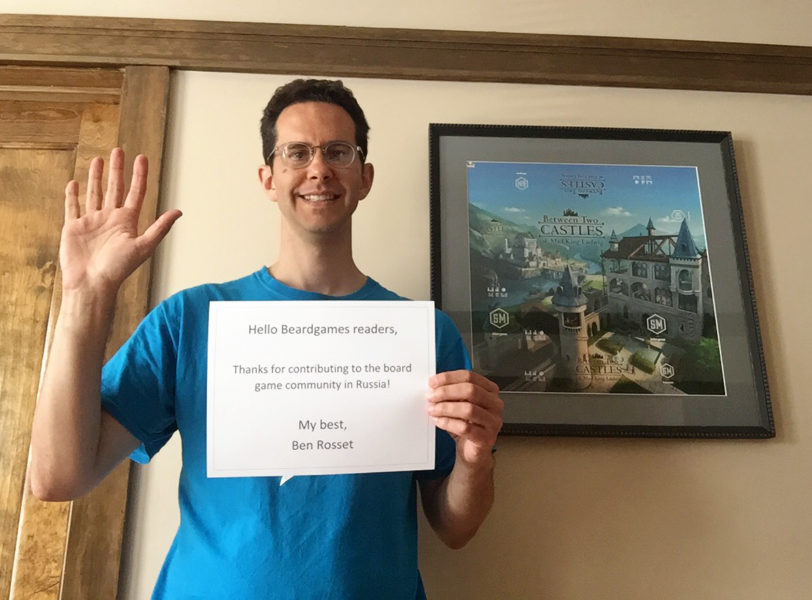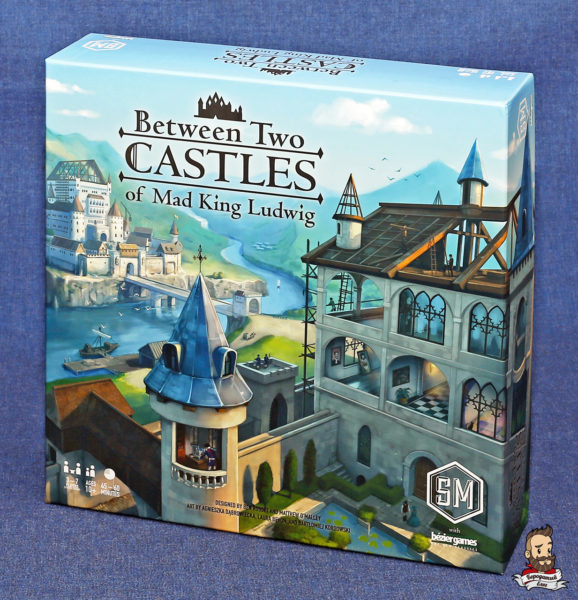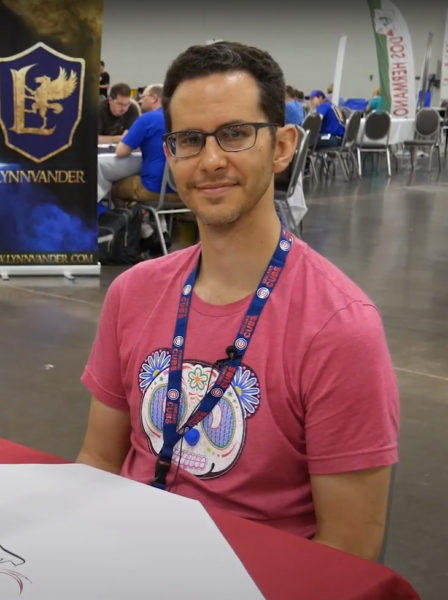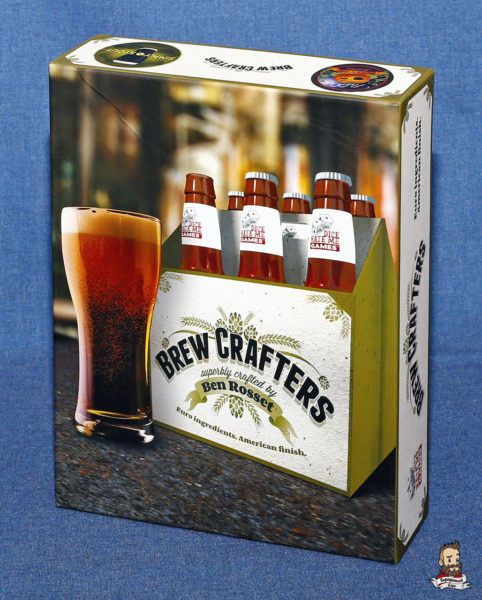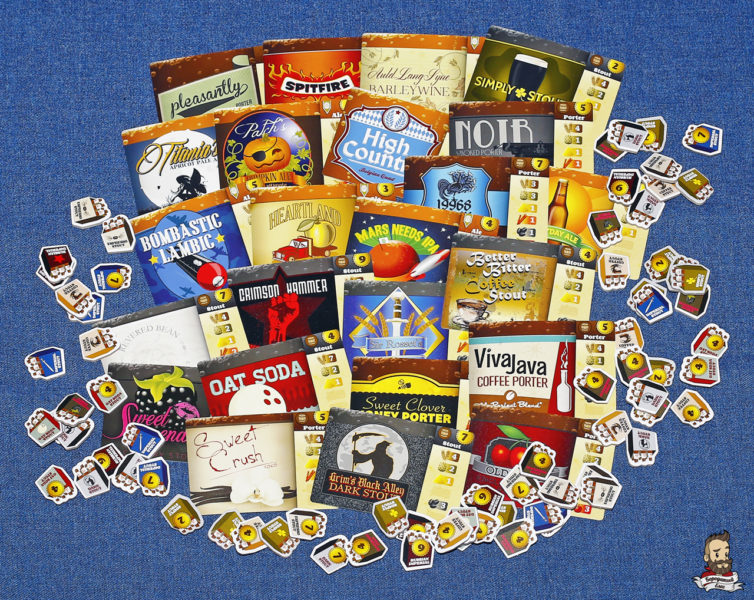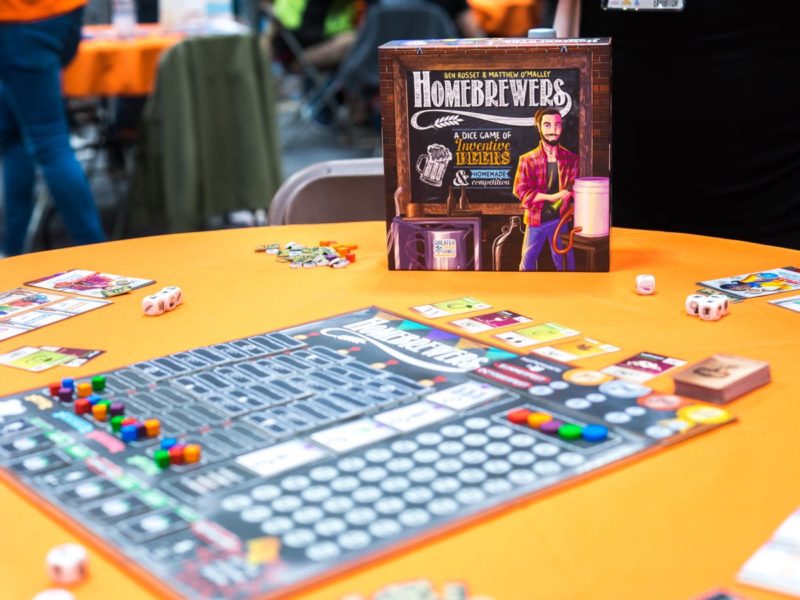Russian gamers may be aware of Ben Rosset through «Between Two Castles of Mad King Ludwig» from Stonemaier Games (and the Russian publisher Crowd Games) and, to a lesser extent, «Between Two Cities». As for me it happened via his other game, «Brew Crafters», which I reviewed some time ago in the blog. With its theme of beer and breweries the game turned out to be just as strong and, what is very important for some, thematic. And it does happen a lot less often than we’d like.
Anyway, in light of this I decided to contact Mr. Rosset and ask him questions about this, and that, and a little bit about «Brew Crafters».
Hello Mr. Rosset. Thank you for agreeing to answer our questions. First off, I suggest we start with you telling us about yourself.
I’m a 39-year old game designer living in Chicago, USA. I’ve been playing and designing modern board games for about 13 years. Aside from designing games, I am also the Director of Training & HR for Panda Game Manufacturing. I also helped to found a tabletop convention in Washington, DC called WashingCon. I’m not involved in WashingCon any longer, but it’s still going strong.
When playing board games, my favorite player color is blue.
Also, I have one cat.
What was it that gave you the idea to become a game designer?
In about 2009, a good friend of mine designed his own game, and I was very impressed. It seemed like a fun thing to do, so I started trying to design games myself as well. I was instantly hooked. I loved game design right from the start, and I’ve been doing it ever since.
What is it in board games that appeal to you the most, as a gamer and as a designer?
As a designer, creating something that brings other people joy appeals to me the most. As a gamer, the challenge of figuring out how a system works and doing my best to master that system is my favorite part.
So far «Between Two Castles of Mad King Ludwig» is the only game of yours that was officially published in Russian, so I suggest to talk about it a bit. How did it all start? What initiated the idea to combine yours «Between Two Cities» and Ted Alspach’s «Castles of Mad King Ludwig»?
After «Between Two Cities» was published, Matthew and I were thinking about other games that could use the similar «Between Two» mechanic of working cooperatively with the players to your right and left while still maintaining a competitive game. We felt that castle-building was a theme that would work well.
As we were working on the game, I couldn’t shake the thought that the game would work best as a re-implementation of the «Castles of Mad King Ludwig» by Bezier Games. I know that Jamey Stegmaier was a big fan of «Castles of Mad King Ludwig», so I approached him and asked him what he thought of the idea of «Between Two Castles of Mad King Ludwig». He liked the idea, so we approached Ted Alspach of Bezier and asked for his permission. He granted his permission, so we got to work designing the game.
Then I guess Mr. Alspach was not involved in the design?
Ted was not involved as a designer, although he and his family did playtest the game and provide feedback at a few different times during the development process, which we were very grateful for!
Since you mentioned the name of Jamey Stegmaier, how did the game end up under his wing?
It was always going to be a «Between Two» game, and therefore the only company we ever considered for publishing it was Stonemaier Games. Thankfully, Jamey liked the mechanics as well as the theme, and he agreed to publish it.
Do you plan to continue collaborating with Stonemaier Games in the future?
Yes, in fact they will be publishing another game of ours in 2020, which I’m super excited about. However, they have not yet announced it publicly, so I can’t say too much about it yet, other than to say that it is not a «Between Two» game. It’s something different. Jamey is a hero of ours in the board game industry, so we are thrilled to continue working with him.
In your opinion, have «Two Castles» turned out to much different from your own «Between Two Cities»? Can the former be called an update of the latter? Or maybe the two games can peacefully co-exist on the shelves of the boardgamers?
I hope that they can co-exist. «Between Two Cities» takes about 20 minutes to play and is a lighter game better suited for new board gamers. «Between Two Castles» is a heavier game that takes about 45 minutes and is probably better suited for gamers that want a deeper challenge.
Besides city and castle building, another theme that is rather common in your games is brewing. Is it because you like beer that much? Or was the setting initially chosen by the publisher?
I had the idea for «Brew Crafters» in 2012 when I took a tour of the Dogfish Head Brewery in Delaware, USA. I learned all about how they had built up a great craft brewery from very humble beginnings, and by the time the tour was over, I had the idea for «Brew Crafters» in my head.
Speaking of «Brew Crafters», which was your first step on the path of board brewing, I have a few questions about it as well. Somewhere in the BGG forums I read a statement that one of the sources of inspiration for the game was «Agricola» by Uwe Rosenberg. Is the statement correct?
Yes that’s correct. I knew that I wanted «Brew Crafters» to be a worker placement and resource management game. «Agricola» is one of my favorite games of all time, and some of the mechanics from «Agricola» definitely inspired me when I was creating «Brew Crafters».
What was it that you didn’t like in «Agricola» and wanted to improve?
As much as I love «Agricola», the one thing that always bothered me about it was that other players could block actions I take on my own farm (growing my family, adding rooms, plowing fields, etc.). Thematically, that didn’t really make sense to me. So in «Brew Crafters», I separated the working placement action phases in two – first comes the market phase, where players can block each other, and then comes the brewery phase, where they can’t. Thematically, this makes more sense to me.
Were there other games that inspired you while working on «Brew Crafters»?
«Viva Java», a game by TC Petty III, also inspired me (and has continued to inspire me throughout the years). I wanted to try to find a way to put positive player interaction, which is featured in «Viva Java», into «Brew Crafters». The way I did it was through the «Collaboration» mechanic in «Brew Crafters», where players can work together to create a collaborative beer recipe.
Despite a certain ‘static’ nature of the «Agricola» gameplay, the cards of Occupations and Minor Improvements, as well as random draw of round action cards, make the game rather replayable. What ensures replayability in «Brew Crafters»?
In Brew Crafters, there are several components that are randomly determined at the beginning of the game that ensure replayability. Those include:
- There are 21 beer recipes, but only 9 get used every game. Each recipe is unique, requiring a different mix of ingredients. So every game will have a different mix of recipes the players can make, which will influence their strategy.
- There are 24 skilled worker cards, but only 9 get used every game. Each worker, once hired, gives the player a unique power or benefit. So every game will have a different mix of workers you can hire, which will influence your strategy.
- There are several optional action spaces you can mix and match and add into the game in any way you want which make each game different from the last.
- If you use the «advanced» side of the research labs, then each player gets a unique research lab with a unique mix of powers available to you, which will influence your strategy.
Why is there no solo mode in the game?
I am not a solo gamer myself, and have never tried to design a solo game. Ever for «Between Two Cities», the solo mode was designed by someone else. And in 2012 and 2013 when I was designing the game, I don’t solo gaming was as popular as it is now. If there is anyone out there who wants to create a set of solo rules for «Brew Crafters» and post them on BGG, I would definitely support that!
Do you think you managed to implement all of the ideas you had for the game? Would you have done anything differently today?
The answer to both of those questions is yes. I was very happy with the game as it was when it was published. And at the same time, if I was redesigning the game today, I would make a few changes, mostly to try and streamline gameplay. When I first started designing games, I was told that for every game, after it’s published, the designer will find things they wish they could change about it. I have certainly found that to be true. A game is never perfect.
What do you think is the highlight of «Brew Crafters»? What element sets the game apart from other games in the genre?
To me, the theme of creating and running your own craft brewery makes it distinct. I am very satisfied with the integration of the theme and mechanics, and I hope that players will agree that when they are playing, they really feel like they are running a brewery and brewing great beer!
You continued the brewing theme with less weightier games such as «Brew Crafters: Travel Card Game» and «Homebrewers». Do you plan to support «Brew Crafters» any further? Are there any expansions planned for this wonderful game?
Thank you for the compliment! At this time, there are no expansions planned for any of my beer-themed games. However, as you mentioned, «Homebrewers» was released in the fall of 2019 from Greater Than Games. «Homebrewers» is a game about learning to brew your own beer at home, and entering your brews into local beer competitions to win the gold medal and be considered the best local Homebrewer. It is lighter than «Brew Crafters» (about 15 minutes per player), and features dice trading instead of worker placement. Because of the dice trading mechanism, it’s also a much more social game than «Brew Crafters» is.
What games do you currently have in development? Can you share any juicy details with our readers?
In addition to «Homebrewers», I have 4 other games that were or will be released in 2020. Only two of them are public knowledge, however, so I can only mention those.
The first one, which was recently released, is «Sugar Blast» from CMON. It’s a competitive match-3 game with a unique, tilting board. It is geared toward families, although gamers will find that they enjoy it as a filler game.
The other one I can mention is «The Search for Planet X» from Foxtrot Games. «Alchemists» from CGE was very inspirational in creating this game. My goal was to make a game that features a deduction puzzle similar to «Alchemists» but that can be played in about 45 minutes. In the «Search for Planet X», the players are astronomers searching for a new planet in our solar system. They scan the sky, gain information about what they find, then use that information to publish theories. The game uses an app that randomizes the deduction puzzle every time you play, so that the game is infinitely replayable, just like «Alchemists». Of all my games, it’s probably the game that I had the most fun designing and that I have the most fun playing.
Do
you have time to play board games for fun? Or, being a game designer, you don’t
really want to even look at them in your free time?
I love playing new games. I have a group of designer friends in Chicago that I
meet with about twice per month to play new published games that we’ve never
played before. As a game designer, I think it’s very important to keep playing
new games that are released.
Can you name some of your favorite games? What is it you like the most about each of them?
My two favorite games are «Alchemists», which I previously mentioned, and «7 Wonders Duel» by Repos Productions. I absolutely love the deduction mechanic of «Alchemists». It’s so satisfying to complete the deduction puzzle that the game features. And «7 Wonders Duel» is just packed with interesting decisions. On every turn, I feel like I am making an interesting and impactful choice, and in my opinion, there is no higher compliment for a game.
Well, I have to say, it all sounds interesting. Thank you for finding time to answer my questions. And good luck with your new designs!
Illustrations taken from the BoardGameGeek.


